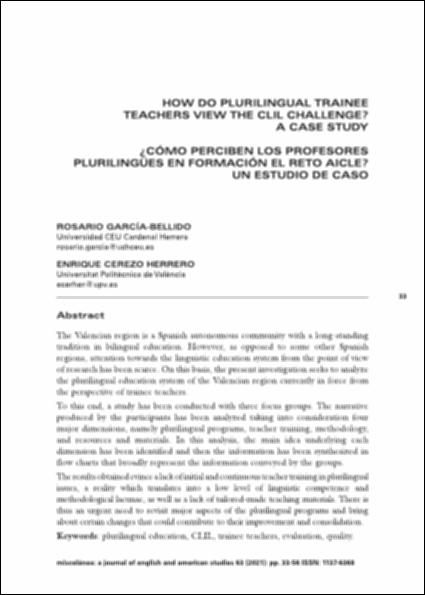Please use this identifier to cite or link to this item:
http://hdl.handle.net/10637/13735How do plurilingual trainee teachers view the CLIL challenge? : a case study
| Title: | How do plurilingual trainee teachers view the CLIL challenge? : a case study |
| Other Titles: | ¿Cómo perciben los profesores plurilingües en formación el reto AICLE? : un estudio de caso |
| Authors : | García Bellido, María Rosario Cerezo Herrero, Enrique |
| Keywords: | Multilingüismo.; Multilingualism.; Teachers.; Maestros.; Educación - Métodos.; Instructional systems.; Occupational training.; Formación profesional. |
| Publisher: | Universidad de Zaragoza, Departamento de Filología Inglesa y Alemana |
| Citation: | García Bellido, R. & Cerezo Herrero, E. (2021). How do plurilingual trainee teachers view the CLIL challenge? : a case study. Miscelánea: a journal of English and American studies, n. 63 (30 jun.), pp. 33-56. DOI: https://doi.org/10.26754/ojs_misc/mj.20215866 |
| Abstract: | The Valencian region is a Spanish autonomous community with a long-standing
tradition in bilingual education. However, as opposed to some other Spanish
regions, attention towards the linguistic education system from the point of view
of research has been scarce. On this basis, the present investigation seeks to analyze
the plurilingual education system of the Valencian region currently in force from
the perspective of trainee teachers.
To this end, a study has been conducted with three focus groups. The narrative
produced by the participants has been analyzed taking into consideration four
major dimensions, namely plurilingual programs, teacher training, methodology,
and resources and materials. In this analysis, the main idea underlying each
dimension has been identified and then the information has been synthesized in
flow charts that broadly represent the information conveyed by the groups.
The results obtained evince a lack of initial and continuous teacher training in plurilingual
issues, a reality which translates into a low level of linguistic competence and
methodological lacunae, as well as a lack of tailored-made teaching materials. There is
thus an urgent need to revisit major aspects of the plurilingual programs and bring
about certain changes that could contribute to their improvement and consolidation. La Comunitat Valenciana es una comunidad autónoma española con una amplia tradición en educación bilingüe. A pesar de ello, y a diferencia de la mayoría de las otras comunidades, la atención prestada al modelo educativo lingüístico desde la investigación ha sido escaso. Por ello, la presente investigación pretende analizar el sistema educativo plurilingüe valenciano vigente desde la perspectiva de los maestros en formación. Con este fin, se ha llevado a cabo un estudio con tres grupos focales. Se ha realizado un análisis de la narrativa de los participantes teniendo en cuenta cuatro dimensiones principales, a saber, los programas plurilingües, la formación de los maestros, la metodología y los recursos y materiales. En el análisis se ha identificado la idea principal que subyace a cada dimensión y luego se ha sintetizado la información en diagramas de flujo que, en líneas generales, representan la información transmitida por los grupos. Los resultados obtenidos evidencian una falta de formación inicial y continua del maestro en cuestiones relativas a la educación plurilingüe, realidad que se traduce en una baja competencia lingüística y lagunas metodológicas, así como en una falta de materiales didácticos apropiados. Por lo tanto, es necesario revisitar aspectos importantes de los programas plurilingües y realizar ciertos cambios que puedan contribuir a la mejora y consolidación de estos. |
| Description: | Este artículo se encuentra disponible en la siguiente URL: https://papiro.unizar.es/ojs/index.php/misc/article/view/5866/4953 |
| URI: | http://hdl.handle.net/10637/13735 |
| Rights : | http://creativecommons.org/licenses/by/4.0/deed.es |
| ISSN: | 1137-6368 |
| Issue Date: | 30-Jun-2021 |
| Center : | Universidad Cardenal Herrera-CEU |
| Appears in Collections: | Dpto. Ciencias de la Educación |
Items in DSpace are protected by copyright, with all rights reserved, unless otherwise indicated.


